Goaltender Terry Sawchuk idolized his older brother Mitch, who wanted to be a goaltender. Sadly, at just seventeen years of age, Mitch died of a heart attack. After inheriting his older brother's goalie equipment Terry began playing hockey in a local league and began to excel to the point that at age 14 a local scout for the Detroit Red Wings had Sawchuk work out for him and later signed Terry to an amateur contract to play for their junior team.
Sawchuk turned pro with Detroit in 1950, filling in for the injured Harry Lumley, who would return in time to lead the Red Wings to the 1950 Stanley Cup championship. Despite winning the championship, Lumley was traded to the Chicago Black Hawks, promoting Sawchuk to the Red Wings goaltending job in time for the 1950-51 season despite having only seven games of NHL experience.
The Red Wings faith in Sawchuk would immediately pay off, as he would record a record of 44 wins, 13 losses and 13 ties with 11 shutouts and a goals against average (GAA) of 1.99 in his first full season, earning the Calder Trophy.
The 1951-52 season saw even more success, as he would again win 44 games, post 12 more shutouts and lower his goals against to 1.90, which would earn him his first Vezina Trophy. The Red Wings would advance through the playoffs and capture the Stanley Cup as NHL champions that season.
Terry Sawchuk and Red Wings captain Sid Abel celebrate winning the 1952 Stanley Cup
Sawchuk would earn another Vezina Trophy in 1953, a second Stanley Cup championship in 1954, both the Vezina and another Stanley Cup in 1955, giving him three of each in just his first five seasons in the league.
Feeling they had a new goaltender on the rise in Glenn Hall, the Red Wings would trade Sawchuk to the Boston Bruins prior to the 1955-56 season. He would record just 22 wins for Boston that season after having had a minimum of 32 during his time in Detroit. In his second season in Boston, Sawchuk was diagnosed with mononucleosis, but returned to the team just two weeks later. His play was poor, as he was weak from the illness and he announced his retirement from hockey early in 1957.
With Hall having fallen out of favor with the Red Wings, they traded Johnny Bucyk to Boston to reacquire Sawchuk for the start of the following season. He would play seven seasons for the Red Wings during his second stint in Detroit. While in Detroit, he would begin wearing a mask for the first time during the 1962-63 season after accumulating over 350 stitches up to that point in his career.
In 1964, Sawchuk would set the NHL record for the most career games by a goaltender, when he appeared in his 804th game, a 3-2 win over the Boston Bruins.
He would post between 22 and 29 wins in five of those seven seasons and add 23 more shutouts to his career total, eventually passing legendary Montreal Canadiens goaltender George Hainsworth's career total of 94 set in 1936, a record that had stood for 28 years.
The Red Wings, feeling Sawchuk was expendable due to the promising Roger Crozier, left Sawchuk exposed in the waiver draft and was claimed by the Toronto Maple Leafs, where the 35-year-old would share goaltending duties with forty-year-old Johnny Bower.
The pair responded by winning the Vezina Trophy in 1965, Sawchuk's fourth, perhaps in part to their decreased workload keeping them fresher on the days they did play, as they both went from 50+ games played down to the mid-30's that year. They were the first pair to share the Vezina, then awarded statistically to the goaltender for the team that gave up the least number of goals and not a vote for who is considered the best goaltender, as it is today.
Two seasons later, in 1966-67, the Maple Leafs would capture the most recent Stanley Cup in their history, and the fourth and final one of Sawchuk's career.
Once more a championship season for Sawchuk was rewarded by being let go by his club, as he was left unprotected in the 1967 expansion draft, and was claimed by the Los Angeles Kings. He would play 36 games for the Kings in 1967-68, adding two more shutouts to his total. The Kings would trade Sawchuk to the Red Wings for 1968-69 and he would play the final season of his career with the New York Rangers, where he played in eight games and recorded the final shutout of his career, giving him a final total of 103.
His final NHL totals were 971 games over 21 seasons, an NHL record 447 wins, 330 losses and 172 ties (also an NHL record), with 23% of his wins coming via shutouts. In addition to his 103 regular season shutouts, he would also record 12 more in the playoffs.
Sawchuk would die at age 40 in 1970 just after the conclusion of the hockey season due to a pulmonary embolism as the result of an accidental injury suffered in a conflict with his Rangers teammate and housemate Ron Stewart.
In 1971 he was named the winner of the Lester Patrick Award and inducted into the Hockey Hall of Fame and his #1 was retired by the Red Wings on this date in 1994.
Sawchuk's record for most wins lasted for 30 years until being broken by Patrick Roy on October 18, 2000 and his 103 shutouts stood as the record for 39 years until being surpassed by Martin Brodeur in December of 2009.
Today's featured jersey is a 1961-62 Detroit Red Wings Terry Sawchuk jersey. The Red Wings jersey is a true classic in the NHL and has remained essentially unchanged since it was introduced back in 1932 when the club changed their name from the Falcons, as they had been known since 1930. The original Detroit red sweaters used red numbers trimmed in white from 1932-33 until a change to single color white numbers in 1937-38, with the next change to the red jerseys being the addition of names in 1977-78.
This jersey was worn by Sawchuk during the 1954-55 season when Detroit won the third of Sawchuk's four Stanley Cups, and is an early example of a Red Wings jersey as evidenced by it's lack of sleeve numbers.
In addition to winning the Stanley Cup in 1955, Sawchuk would also play in the NHL All-Star Game and win his second Vezina Trophy that year.
Bonus jersey: Today's bonus jersey is a 1961-62 Detroit Red Wings Terry Sawchuk jersey. From 1932 to 1934, the Red Wings only wore red sweaters for both home and road games, with the white jersey not being introduced until the 1934-35 season. The next real change of note was the addition of red sleeves decorated with sleeve numbers for the first time in 1961, as seen on today's bonus jersey. Names would not appear until 1973 with only changes to fonts for the name and numbers since.
This Legends of Hockey profile covers Sawchuk's career from the time of his youth through the end of his career and premature death at age 40.
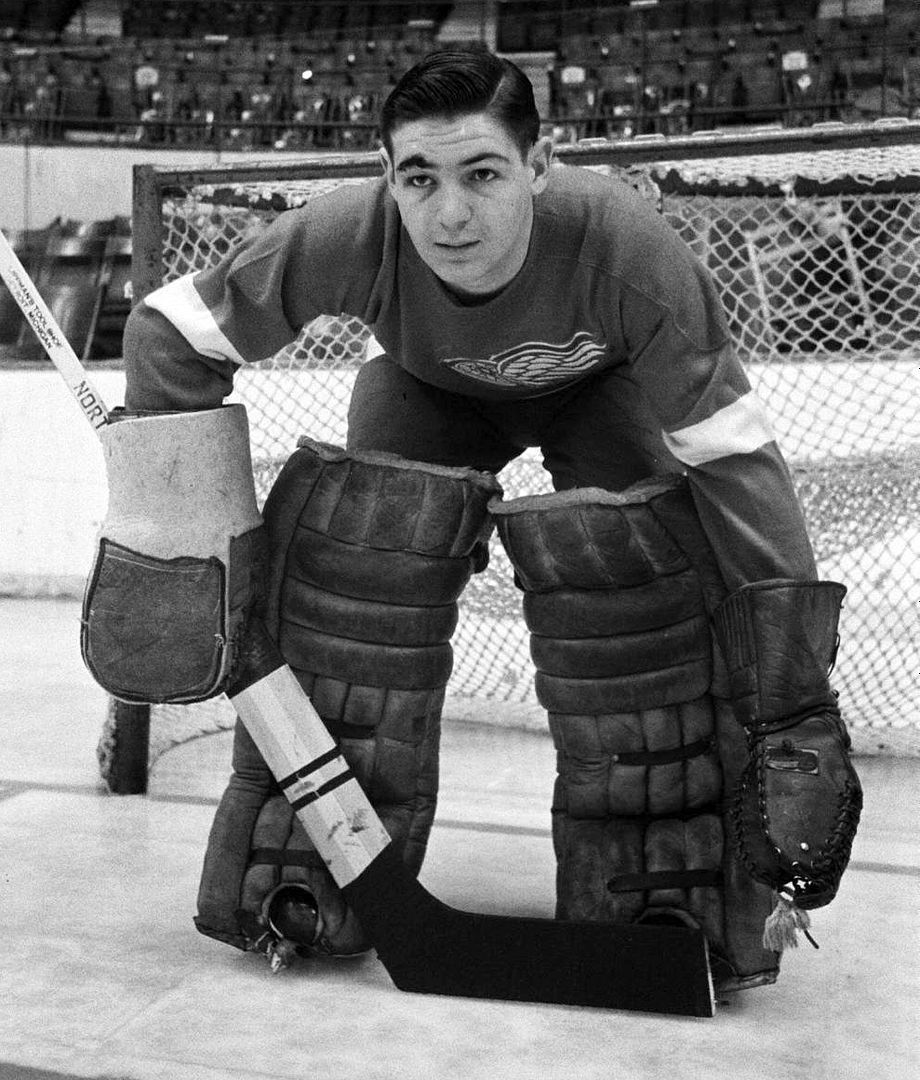
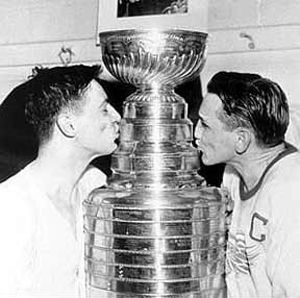
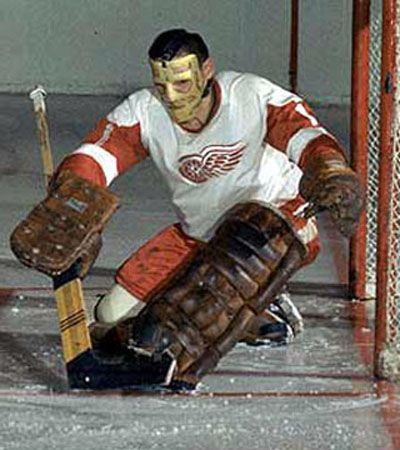
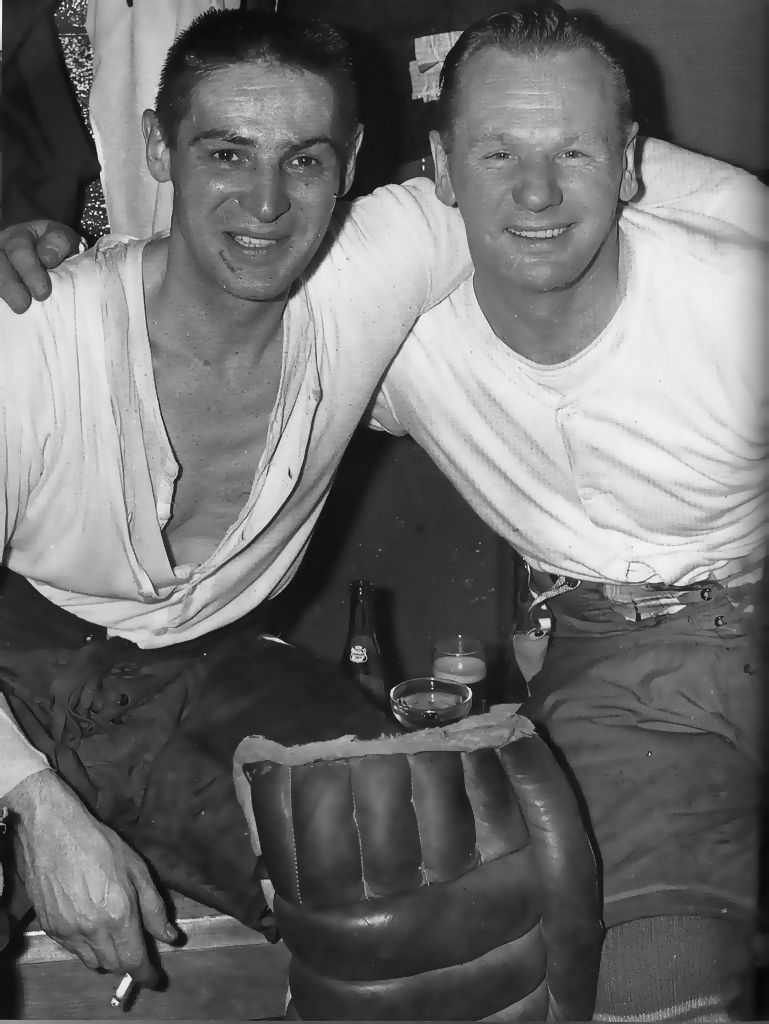


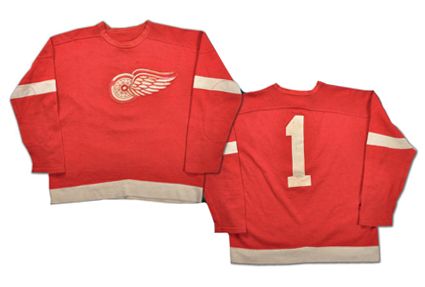











No comments:
Post a Comment
We welcome and encourage genuine comments and corrections from our readers. Please no spam. It will not be approved and never seen.